|
|
|
Sort Order |
|
|
|
Items / Page
|
|
|
|
|
|
|
| Srl | Item |
| 1 |
ID:
133719
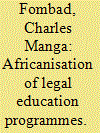

|
|
|
|
|
| Publication |
2014.
|
| Summary/Abstract |
Debates and discussions about the African renaissance and the Africanisation of universities have raged for decades. The goal of developing an emancipatory Afrocentric system that frees African education from the continuous and dominant influence of Euro- and American-centric cultural values remains a challenge. This is particularly so with respect to conventional African legal training and research programmes. Some African legal scholars, sometimes imbued with xenophilia, have in many ways participated in the process that has seen the continuous marginalisation of studies on the law in Africa and African law. This paper argues that there is a need to rethink the place devoted to the study of African law and African legal systems. It contends that African law generally and African legal systems specifically will hardly be able to develop when present-day students spend most of their time, especially in a course such as comparative law, studying western legal systems. In order for African legal education to be relevant and meaningful it must prepare and equip today's lawyers to operate in a global world. It is therefore suggested that an Africanised legal programme should include a course on African legal studies and aim to be contextually and globally relevant whilst being sufficiently innovative and flexible to address the urgent needs of our times.
|
|
|
|
|
|
|
|
|
|
|
|
|
|
|
|
| 2 |
ID:
037971
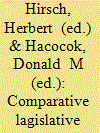

|
|
|
|
|
| Publication |
New York, The Free press, 1971.
|
| Description |
vii, 469p
|
|
|
|
|
|
|
|
|
|
|
|
Copies: C:1/I:0,R:0,Q:0
Circulation
| Accession# | Call# | Current Location | Status | Policy | Location |
| 010223 | 328/Edited by 010223 | Main | On Shelf | General | |
|
|
|
|
| 3 |
ID:
034523
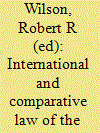

|
|
|
|
|
| Publication |
Durham, Duke University Press, 1968.
|
| Description |
vii,247p.
|
|
|
|
|
|
|
|
|
|
|
|
Copies: C:1/I:0,R:0,Q:0
Circulation
| Accession# | Call# | Current Location | Status | Policy | Location |
| 004595 | 341/WIL 004595 | Main | On Shelf | General | |
|
|
|
|
| 4 |
ID:
054225
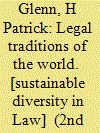

|
|
|
|
|
| Edition |
2nd ed.
|
| Publication |
Oxford, Oxford University Press, 2004.
|
| Description |
xx, 401p.
|
| Standard Number |
0199260885
|
|
|
|
|
|
|
|
|
|
|
|
Copies: C:1/I:0,R:0,Q:0
Circulation
| Accession# | Call# | Current Location | Status | Policy | Location |
| 048729 | 340.2/GLE 048729 | Main | On Shelf | General | |
|
|
|
|
| 5 |
ID:
097150
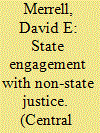

|
|
|
|
|
| Publication |
2010.
|
| Summary/Abstract |
Currently there is a question of whether and how Afghanistan should engage non-state councils of elders to resolve disputes. In order to harness their benefits (e.g. efficiency), control their abuses (e.g. occasional controversial resolutions), and stabilize the resolution of disputes, some have argued that formal links should be established between the state judicial system and non-state councils of elders in Afghanistan. Others argue that mere informal links between the two systems should be established. Still others suggest that prior models of state engagement in Afghanistan should be revived. In Kyrgyzstan, just 65 miles north of Afghanistan, the Tsarist, Soviet and post-Soviet administrations have used various methods to engage non-state councils of elders. Despite these vastly different attempts at controlling local dispute resolutions, elders independently resolved disputes outside of Tsarist and Soviet control and continue to resolve disputes outside of post-Soviet state control in Kyrgyzstan. This phenomenon highlights the need for legitimacy in any models of state engagement that are considered for Afghanistan. If, as observed in Kyrgyzstan, people do not use state-sanctioned local councils in Afghanistan, then their purposes may be frustrated. Therefore, in addition to reviewing the experience with state engagement in other parts of the world, policy makers in Afghanistan should also review the historical and contemporary experience with state engagement in Kyrgyzstan. As the need for legitimacy is reconsidered and applied to the design of models for Afghanistan, it may be more likely that those models will be used by more people in Afghanistan and that their purposes will be furthered.
|
|
|
|
|
|
|
|
|
|
|
|
|
|
|
|
|
|
|
|
|